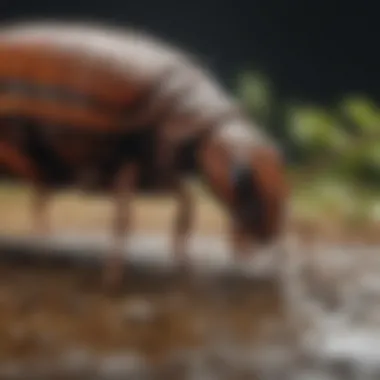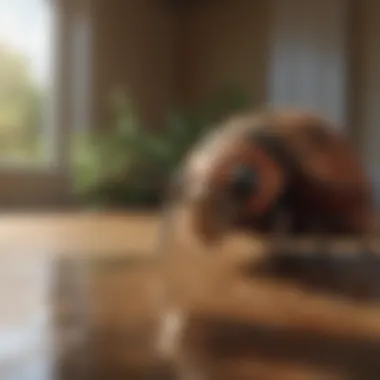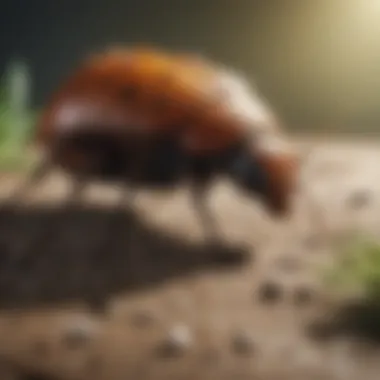Understanding Pest Control Practices in Yorktown


Intro
Pest control is a vital aspect of home maintenance, particularly in regions like Yorktown where various pests can thrive. This article aims to shed light on effective pest control tactics suited for the unique environment of Yorktown. By understanding the pests that commonly invade homes and yards, readers can take informed steps to protect their living spaces. Important subjects such as pest identification, their life cycles, practical prevention strategies, and various control methods will be thoroughly examined.
Understanding the Pest
Identification
The first step in pest control is identifying the organism causing the issue. Yorktown experiences a range of pests, including ants, mice, and termites. Ants, for example, can invade kitchens, while mice may gnaw through wiring and contaminate food supplies. Knowing which pests are present can help in choosing the correct method for management.
Here are some common pests in Yorktown:
- Ants: Often found in and around food sources.
- Termites: Wood-destroying insects that can compromise structural integrity.
- Mice: Nocturnal and capable of reproducing rapidly.
Properly identifying these pests involves looking for signs such as droppings, nests, or actual sightings. Homeowners should familiarize themselves with the physical characteristics of the pests in their area to accurately determine the best course of action.
Life Cycle
Understanding a pest's life cycle can significantly enhance management efforts. Many common pests follow a simple life cycle of egg, larva, and adult stages. For instance:
- Ants may have queens that lay hundreds of eggs.
- Termites have nymphs that develop into workers or reproductive adults.
- Mice typically breed every few weeks, producing multiple litters in a year.
Knowing when pests are most active can allow for timely preventive measures. For example, treating homes against ants in early spring can prevent infestations during the warmer months.
Pest Prevention Strategies
Environment Modification
One effective strategy for preventing pest problems is to modify the environment. This can involve:
- Eliminating food sources: Store food in airtight containers to deter pests.
- Cleaning regularly: Maintain cleanliness, especially in kitchens, to reduce attractions for pests.
- Managing moisture: Address leaky pipes and standing water, as many pests thrive in humid environments.
By making these changes, homeowners can create an environment less hospitable to pests.
Physical Barriers
Setting up physical barriers can also protect against invasions. Simple measures include:
- Sealing cracks and openings: This prevents entry for rodents and insects.
- Installing door sweeps: These can guard against mice and bugs attempting to enter through gaps.
- Using screens on windows: Keeping windows open can be tempting but having screens prevents pests from flying in.
Control Methods
Chemical Control
When preventive measures are not enough, chemical control can be considered. This includes various pesticide products, which should be used carefully to protect human and environmental health. Choosing the right product is crucial. Always opt for labeled pesticides specific to the target pest and follow instructions to minimize risks.
Biological Control
Another effective method is biological control, which involves using natural predators or parasites to manage pest populations. For instance, introducing ladybugs can help control aphid populations in gardens. This method aligns with eco-friendly practices, reducing reliance on harsh chemicals.
"Employing biological control can enhance sustainability and maintain balance in the ecosystem."
In summary, understanding the pests of Yorktown and applying effective management techniques is crucial for maintaining a pest-free home. By identifying pests, modifying environments, establishing barriers, and knowing control methods, homeowners can effectively tackle pest problems. This guide aims to equip readers with knowledge and strategies for achieving a healthier, pest-free environment.
Preface to Pest Control
Pest control is a critical topic that directly impacts the quality of life in any household. This section of the article seeks to delineate what pest control entails and why it is indispensable for maintaining a healthy living environment in Yorktown.


Defining Pest Control
Pest control refers to the regulation or management of species recognized as pests, which can negatively affect human health, agriculture, or property. The primary aim of pest control is the elimination or mitigation of pests, including insects, rodents, and other wildlife that invade homes and gardens. Pests are not just a nuisance; they may carry diseases, damage structures, and harm plants. In Yorktown, common pests include termites, cockroaches, and garden insects, all of which require effective management to avoid escalation.
The Importance of Pest Management
Effective pest management is crucial. It involves multiple strategies to prevent, control, or eliminate pest populations while ensuring minimal risks to people and the environment. Homeowners must understand the importance of not only addressing existing infestations but also preventing future occurrences. For instance, regular inspections, proper sanitation, and maintenance of physical barriers can significantly reduce the risk of pests re-entering a property.
Effective pest management safeguards health, protects property, and promotes a comfortable living environment.
In addition to protecting health and property, pest control also contributes to economic benefits. Severe infestations can lead to costly repairs or treatments. Furthermore, education on pest management can empower homeowners, enabling them to take proactive measures and make informed decisions about pest control options available. As Yorktown continues to grow and develop, understanding these elements of pest control will remain vital for homeowners committed to maintaining a pest-free home.
Common Pests in Yorktown
Understanding the common pests in Yorktown is crucial for effective pest management. Those who live in this area may frequently face challenges from certain insects and rodents. Identifying these pests helps homeowners develop suitable strategies for control and prevention. Furthermore, awareness of these pests may prevent infestations and reduce potential damage to property and garden.
Identifying Household Pests
Household pests can disrupt daily living in Yorktown. Common household pests include ants, cockroaches, and rodents.
- Ants: Often found in kitchens and pantries, they seek food sources.
- Cockroaches: They thrive in warm, moist areas, creating health concerns.
- Rodents: Mice and rats often find shelter, causing damage and spreading disease.
Recognizing the signs of these pests is important. For example, droppings, gnaw marks, or food contamination indicate the presence of rodents. Knowing their habits helps in choosing the right control method.
Common Garden Pests
Yorktown's gardens face threats from several pests that can harm plants and vegetables.
- Aphids: These small insects suck sap from plants, causing wilting.
- Japanese Beetles: They consume foliage and flowers, damaging the aesthetics of gardens.
- Spider Mites: These pests are difficult to see but can cause significant damage by feeding on plant cells.
In addition to these, slugs and snails also invade gardens, especially in moist conditions. Regular inspections of plants help to catch these pests early, reducing their impact.
Seasonal Pest Variations
Pest activity often changes with the seasons in Yorktown. Understanding these variations assists in timing management efforts.
- Spring: This is a peak season for insects like ants and mosquitoes. Warmer temperatures encourage insects to emerge after winter.
- Summer: Heat attracts more activity. Pests like wasps and flies are more prevalent.
- Fall: Many pests seek shelter in homes as temperatures drop. Rodents become more active at this time.
- Winter: Pest activity decreases, but some may hibernate or seek warmth indoors.
Being aware of these seasonal patterns helps homeowners remain proactive, adjusting their pest prevention strategies accordingly.
DIY Pest Control Solutions
DIY pest control solutions play a vital role in managing common pests effectively. Homeowners often prefer these methods for several reasons. First, they can be a cost-effective alternative to professional services. Second, many DIY solutions use materials that are readily available at home or in local stores. This accessibility can foster a sense of empowerment, allowing homeowners to take charge of their environment. However, it is crucial to approach DIY pest control with an informed mindset. Misapplication can lead to pest problems worsening, not improving.
Effective Home Remedies
Numerous home remedies can serve as effective pest control solutions. Here are some common ones:
- Vinegar: This citrus-like substance can repel ants when sprayed at entry points. Its potent smell is not only unpleasant to ants but also acts as a natural cleaner.
- Boric acid: A widely-acknowledged solution for roaches, boric acid can kill these pests when ingested. Sprinkling it in common hiding spots can aid in management.
- Essential oils: Oils like peppermint or tea tree can deter insects. Mixing them with water and spraying in affected areas can result in fewer pests.
Before employing these remedies, it is essential to conduct some research. Understanding the behavior of pests can enhance the effectiveness of these home solutions.
Preventive Measures for Homeowners
Prevention is the first line of defense in pest control. Homeowners can adopt several practical measures to minimize pest infestations. Here are some key strategies:
- Seal entry points: Inspect your home and seal gaps and cracks. This initiative prevents pests from entering your living space.
- Maintain cleanliness: Regular cleaning can remove food sources that attract pests. Pay attention to places like kitchens, bathrooms, and dining areas.
- Store food properly: Keeping food in airtight containers can significantly reduce pest attractions in your home. This simple change can make a substantial difference.
In addition, taking out trash regularly and not leaving pet food out overnight can also assist in minimizing infestations.


Gardening Best Practices
For those with gardens, best practices can ensure a pest-free environment. Organic gardening offers valuable strategies for achieving this goal:
- Companion planting: Certain plants, when grown together, can naturally deter pests. For example, marigolds near vegetables can keep away nematodes and some aphids.
- Regular monitoring: Consistently check for signs of pest infestations. Early detection can sometimes prevent overwhelming infestations that require more drastic measures.
- Crop rotation: Changing the types of plants grown in each section of the garden can reduce the likelihood of pests that thrive on specific plants. This practice disrupts their lifecycle.
By adopting these techniques, homeowners can create a sustainable approach to pest control while fostering a healthy environment for their plants.
Understand that the foundation of effective pest management lies in diligent preventive measures. Regular attention to your home and garden can minimize the need for drastic actions later.
Professional Pest Control Options
Professional pest control is an essential consideration for homeowners in Yorktown. It brings expertise that is difficult to match when dealing with infestations. While DIY methods may work for minor issues, professional services provide comprehensive solutions that target both the symptoms and sources of pest problems.
For homeowners, the choice of pest control service is crucial. It is vital to select a company that has a solid reputation in the community, offers a range of services, and uses environmentally conscious methods. Asking for referrals from friends or checking online reviews can lead to finding a reliable provider. Certifying that the service is licensed and insured adds an extra layer of assurance.
Choosing a Pest Control Service
When selecting a pest control service, one should consider several factors. First, evaluate their experience. Companies that have been in business for several years often have better tactics to manage pests effectively. Next, inquire about their methods. Some companies rely on traditional chemicals, while others utilize eco-friendly approaches. Determine what aligns with your philosophy regarding pest management.
Additionally, request a detailed estimate before any work begins. This estimate should outline the proposed services, frequency of treatments, and any guarantees or warranties offered. Knowing these details can help homeowners make an informed decision on which service suits their needs best.
Understanding Treatment Methods
There are various treatment methods employed by pest control professionals. Chemical treatments continue to be a common option. However, there are many eco-friendly alternatives available today. These include baiting systems, traps, and organic insecticides. Understanding these methods is essential for homeowners to determine which works best for their specific pest issues.
It is also critical to know how these treatments affect the environment and the health of your family. Some methods are more sustainable than others, which can influence long-term pest control strategies. Professionals usually tailor their treatments based on the type of pest, the severity of the infestation, and the specific environment of the home.
Importance of Integrated Pest Management
Integrated Pest Management, or IPM, is a holistic approach to pest control that focuses on long-term prevention through a combination of techniques. It emphasizes using knowledge about pest biology and behavior to minimize their prevalence. For homeowners, choosing an IPM-based service can mean fewer pesticides and a healthier living environment.
The benefits of IPM are substantial. It reduces the chance of pest resurgence by targeting the underlying causes of infestations rather than just killing the pests. Furthermore, IPM promotes the use of natural enemies, which can keep pest populations in check without harming the ecosystem. For those in Yorktown interested in sustainability, finding a company that practices IPM can be a significant advantage.
"Employing Integrated Pest Management can significantly reduce chemical usage, protecting both your home and the environment."
In summary, professional pest control options play a crucial role in managing pest issues effectively. Homeowners must focus on selecting the right service, understand the treatment methods utilized, and advocate for practices like Integrated Pest Management. This approach not only protects home environments but also ensures the health of the community as a whole.
Eco-Friendly Pest Control Approaches
Eco-friendly pest control approaches have emerged as a vital component in contemporary pest management strategies, particularly in Yorktown. These methods prioritize the health of both residents and the environment, as traditional pest control often involves chemical treatments that can have harmful side effects on ecosystems and human health. By focusing on eco-friendly options, homeowners can manage pest issues effectively while minimizing risks associated with chemical exposure.
The benefits of implementing eco-friendly pest control methods are numerous. Not only do these techniques strive to reduce the ecological footprint, but they also contribute to the sustainability of the local community. Using natural solutions can lead to a stronger awareness of the interconnectedness of our ecosystems, promoting responsible stewardship of our surroundings. Additionally, an increasing number of individuals are showing preference for homes that reflect a commitment to environmental sustainability, making eco-friendly options a selling point for property values in Yorktown.
Natural Pest Control Solutions
Natural pest control solutions include a variety of methods that leverage biological agents or environmental factors to manage pest populations. Examples include the use of essential oils, vinegar, or even soap solutions that can deter insects without causing harm to humans or pets.
Consequently, many households in Yorktown have found success using natural deterrents for common pests like ants, mosquitoes, and spiders. These solutions tend to be safer, more affordable, and often easier to obtain than conventional pesticides. Homeowners can create their own formulations using commonly available household items, reducing reliance on commercial products.
Some effective natural remedies include:
- Diatomaceous Earth: This powdery substance is effective against insects with exoskeletons, like fleas and cockroaches. It works by dehydrating the pests upon contact.
- Garlic Spray: Garlic has natural insect-repelling properties that can deter several pests when diluted and sprayed in garden areas.
- Neem Oil: Extracted from the seeds of the neem tree, this oil targets pests while being non-toxic to beneficial insects.
Utilizing Beneficial Insects
Harnessing the power of beneficial insects is another critical strategy in eco-friendly pest control. Certain insects play a crucial role in natural pest management by preying on or out-competing harmful pests. Encouraging their presence can be an effective way to maintain pest populations at manageable levels.


Examples of beneficial insects include:
- Ladybugs: They consume aphids and other soft-bodied insects.
- Lacewings: These insects are voracious consumers of pests like thrips and caterpillars.
- Parasitic Wasps: They lay eggs inside pest insects, leading to natural population control.
Homeowners can attract these beneficial insects by planting native flora and creating habitats that support their life cycles. This natural approach not only helps in managing pests but also preserves biodiversity in the area.
Sustainable Practices in Pest Management
Sustainable pest management integrates various eco-friendly practices into a holistic framework. It emphasizes long-term pest prevention by focusing on building healthy ecosystems rather than relying on reactive measures. Some sustainable methods include crop rotation, maintaining diverse plant life, and managing site conditions.
Practices to consider include:
- Regular Maintenance: Keeping up with yard work can deter pest infestations. This includes trimming overgrown plants, cleaning debris, and ensuring no stagnant water collects in the area.
- Soil Health Management: Healthy soils support healthy plants that are naturally more resistant to pests. Using organic compost and avoiding harmful chemical fertilizers can improve soil vitality.
- Integrated Pest Management (IPM): This approach combines various management techniques, such as habitat manipulation and selective pesticide use, to reduce reliance on chemicals while effectively managing pest populations.
"Implementing sustainable practices in pest management not only protects your home but also safeguards the natural surroundings of Yorktown."
By adopting eco-friendly pest control approaches, homeowners in Yorktown can protect their residences while promoting a cleaner, healthier environment for future generations.
Legal and Regulatory Considerations
Understanding the legal and regulatory aspects of pest control is crucial for homeowners and professionals in Yorktown. In the pursuit of a pest-free environment, awareness of local regulations not only ensures compliance but also promotes safe practices. Homeowners must navigate various rules that govern pesticide application, treatment methods, and the overall management of pest populations.
Local Regulations on Pest Control
Local regulations in Yorktown outline the dos and don'ts of pest control. These regulations can include licensing requirements for pest control companies, restrictions on certain pesticides, and protocols for applying chemical treatments. For instance, certain chemicals might be banned or limited due to potential harm to local wildlife or human health.
Moreover, many municipalities have laws regarding notification before pest control treatments, especially for multi-family housing. This means if you live in an apartment complex, your landlord must inform you before applying pesticides. Homeowners should directly consult local government websites or resources such as Wikipedia for the latest updates on relevant laws.
A few key points regarding local regulations include:
- Licensing: Ensure that any pest control service used is licensed and certified.
- Chemical Restrictions: Be aware of prohibited substances in your area.
- Notification Laws: Know your rights regarding notification of treatment.
Safety Standards for Pest Control Products
Safety is paramount when it comes to pest control. Significant efforts are made to regulate the substances used in pest management. The Environmental Protection Agency (EPA) in the United States sets strict safety standards for pest control products. Products must be tested for efficacy and their potential impact on human health.
Homeowners should pay attention to labels and safety data sheets when selecting pest control products. An important aspect of these standards is they help ensure that the application does not pose unnecessary risk to pets, children, or even plants.
Additionally, understanding proper application techniques, disposal methods, and emergency procedures can prevent accidents. Here are some points to consider:
- Read Labels: Always follow label instructions carefully.
- Proper Storage: Store products safely away from children and pets.
- Emergency Response: Familiarize yourself with emergency procedures in case of an accidental exposure.
"Awareness of legal protocols and safety standards can safeguard not just your home, but also the community health."
When considering pest control in Yorktown, compliance with these regulations and standards is not just a responsibility; it reflects a commitment to maintaining a safe and healthy environment for everyone.
Closure and Best Practices
In the realm of pest control, understanding effective strategies and best practices is crucial for homeowners in Yorktown. As discussed throughout this article, effective pest management not only enhances the aesthetics of a home and garden, but also contributes to the overall health and safety of living environments. Proper pest control can preemptively eliminate infestations before they become problematic, thus saving resources and reducing stress for residents.
Summarizing Effective Strategies
Homeowners should focus on several key strategies to manage pests effectively:
- Regular inspections: Periodically checking for signs of pest activity can help catch infestations early.
- Proper sanitation: Keeping living environments clean and free of food debris deter pests from entering.
- Utilizing barriers: Installing screens and sealing cracks can limit pests' access to homes.
- Natural repellents: Engaging with eco-friendly solutions can effectively repel pests without harmful chemicals.
These strategies form a solid foundation for pest management in Yorktown. They encourage ongoing vigilance and promote a pest-free environment.
Future Trends in Pest Control
As we look to the future, several trends are emerging in pest control that are worth noting:
- Technological advancements: Innovations such as digital monitoring systems and automated traps are changing the landscape of pest management.
- Biological control methods: Increasingly, there is a shift towards utilizing natural predators or parasites to control pest populations.
- Sustainability practices: There is a growing emphasis on using eco-friendly substances and methods, ensuring pest control is less harmful to the environment.
These trends reflect a broader societal move towards more responsible and sustainable practices in pest management. Homeowners in Yorktown should stay informed about these developments to enhance their pest control effectiveness while minimizing harm to the ecosystem.







